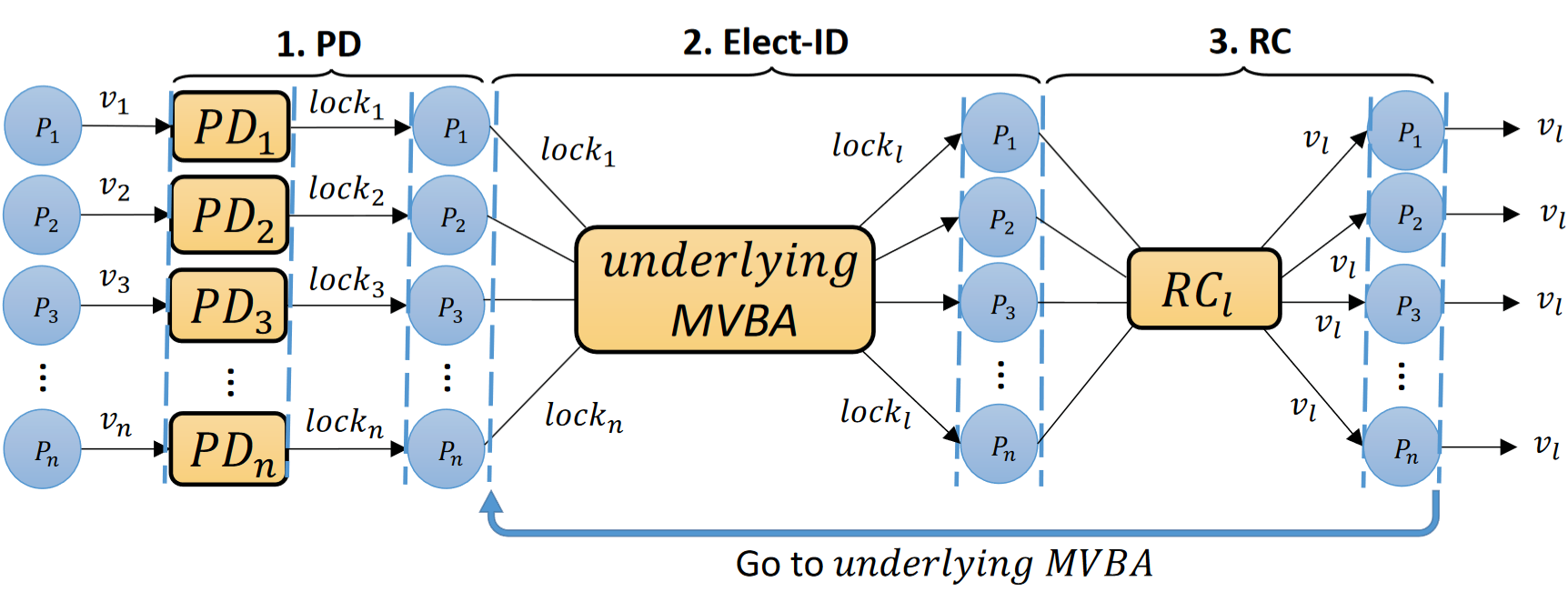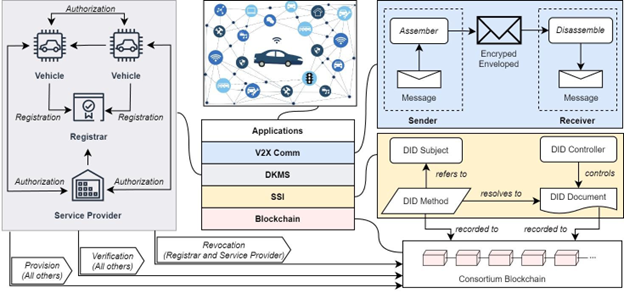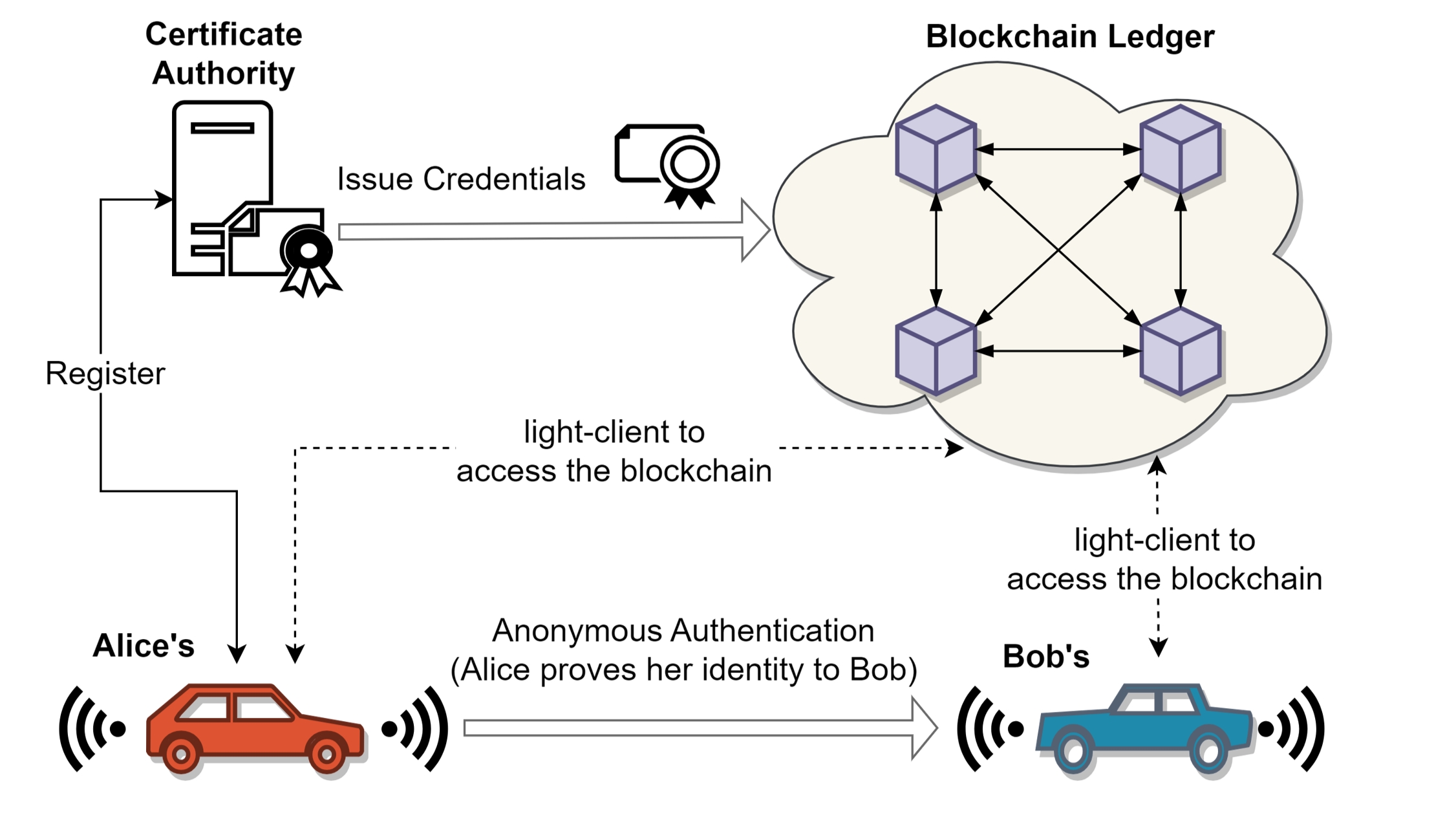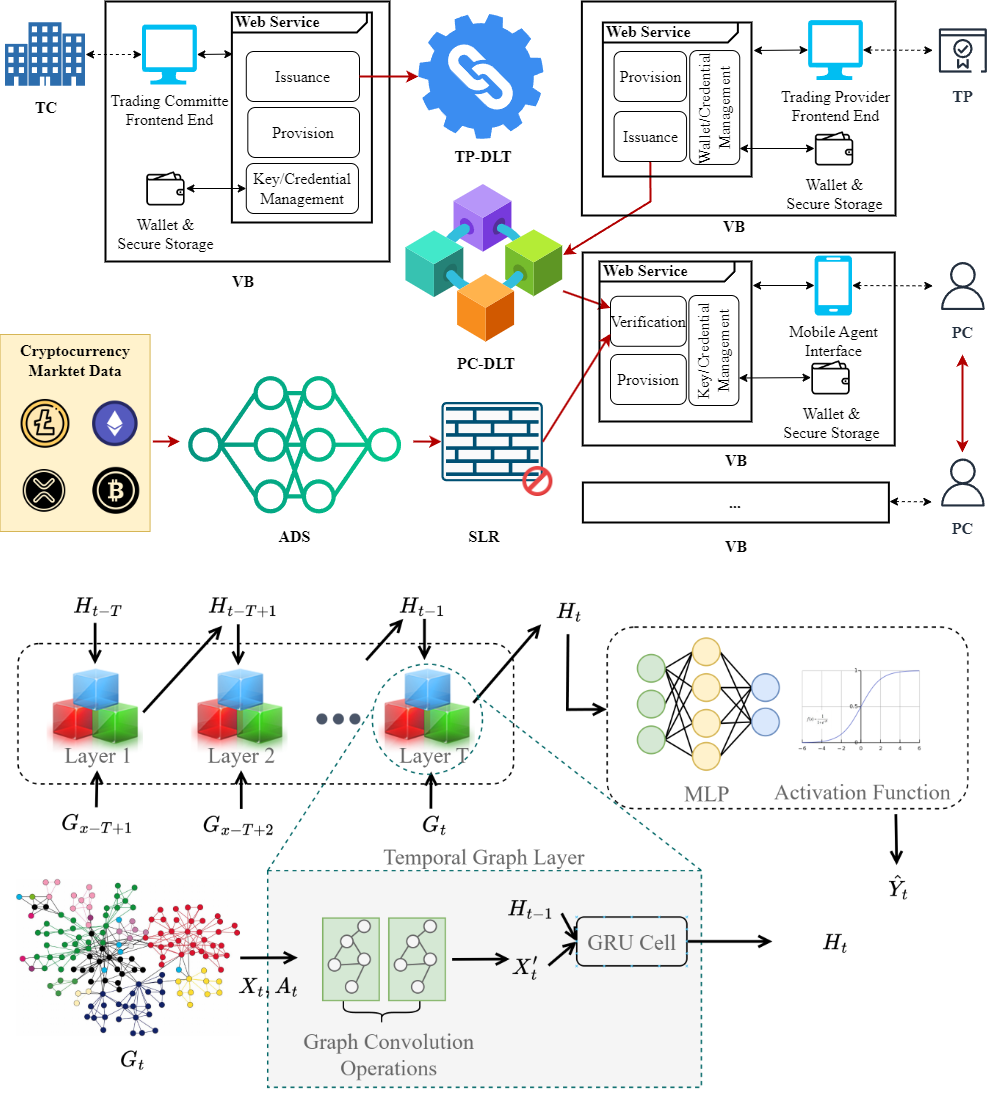Research Projects on Blockchain
- Dumbo-MVBA: Optimal Multi-Valued Validated Asynchronous Byzantine Agreement, Revisited
- iBCTrans: A Practical Blockchain-Based Framework for Cellular Vehicular-To-Everything Networks
- VDKMS: Vehicular Decentralized Key Management System for Cellular Vehicular-to-Everything Networks
- ADPP: A NOVEL ANOMALY DETECTION AND PRIVACY-PRESERVING FRAMEWORK USING BLOCKCHAIN AND NEURAL NETWORKS IN TOKENOMICS
Dumbo-MVBA: Optimal Multi-Valued Validated Asynchronous Byzantine Agreement, Revisited
Multi-valued validated asynchronous Byzantine agreement (MVBA), introduced by Cachin et al. (CRYPTO '01), is essential for fault-tolerant services like atomic broadcast in asynchronous networks. An open problem has been to reduce the communication complexity from \( O(\ell n^2 + \lambda n^2 + n^3) \), where \( n \) is the number of parties, \( \ell \) is the input length, and \( \lambda \) is the security parameter. Abraham et al. (PODC '19) removed the \( n^3 \) term for small inputs, but when \( \ell \geq \lambda n \), the communication remains dominated by the \( \ell n^2 \) term, leaving Cachin et al.'s problem unresolved. We address this gap by presenting two MVBA protocols with \( O(\ell n + \lambda n^2) \) communicated bits, optimal when \( \ell \geq \lambda n \). Our protocols also offer optimal resilience, tolerating up to \( n/3 \) adaptive Byzantine corruptions, optimal constant running time, and \( O(n^2) \) messages. Central to our design is asynchronous provable dispersal broadcast (APDB), which efficiently splits and recovers inputs among parties. Using APDB and asynchronous binary agreement, we develop Dumbo-MVBA and Dumbo-MVBA*, a self-bootstrap framework that reduces communication in existing MVBA protocols.

iBCTrans: A Practical Blockchain-Based Framework for Cellular Vehicular-To-Everything Networks
As Intelligent Transportation Systems and Connected Vehicles become increasingly prevalent, establishing secure, efficient, and scalable communication infrastructures has become imperative. This paper introduces iBCTrans, a novel framework designed specifically for Cellular Vehicular-to-Everything (C-V2X) Networks, leveraging a blockchain-based approach to address the challenges in vehicular communication scenarios. iBCTrans integrates blockchain technology with Self-Sovereign Identity (SSI) principles and Decentralized Identifiers (DIDs) to facilitate secure and trustworthy V2X applications among vehicles, infrastructure, and networks. In this framework, vehicles can authenticate their identities in a secure and privacy-preserving manner, ensuring the integrity and reliability of the communication. A detailed overview of the iBCTrans architecture, components, protocols, and workflows is presented and potential applications in various vehicular communication scenarios are discussed. The proposed iBCTrans framework aims to provide a robust solution for the emerging demands of V2X communications, paving the way for the next generation of intelligent vehicular networks.

VDKMS: Vehicular Decentralized Key Management System for Cellular Vehicular-to-Everything Networks
The rapid development of intelligent transportation systems and connected vehicles has highlighted the need for secure and efficient key management systems (KMS). In this paper, we introduce VDKMS (Vehicular Decentralized Key Management System), a novel Decentralized Key Management System designed specifically as an infrastructure for Cellular Vehicular-to-Everything (V2X) networks, utilizing a blockchain-based approach. The proposed VDKMS addresses the challenges of secure communication, privacy preservation, and efficient key management in V2X scenarios. It integrates blockchain technology, Self-Sovereign Identity (SSI) principles, and Decentralized Identifiers (DIDs) to enable secure and trustworthy V2X applications among vehicles, infrastructures, and networks. We first provide a comprehensive overview of the system architecture, components, protocols, and workflows, covering aspects such as provisioning, registration, verification, and authorization. We then present a detailed performance evaluation, discussing the security properties and compatibility of the proposed solution, as well as a security analysis. Finally, we present potential applications in the vehicular ecosystem that can leverage the advantages of our approach.

ADPP: A NOVEL ANOMALY DETECTION AND PRIVACY-PRESERVING FRAMEWORK USING BLOCKCHAIN AND NEURAL NETWORKS IN TOKENOMICS
The increasing popularity of crypto assets has resulted in greater cryptocurrency investor interest and more exposure in both industry and academia. Despite the substantial socioeconomic benefits, the anonymous character of cryptocurrency trading makes it prone to abuse and a magnet for illicit purposes, which cause monetary losses for individual traders and erosion in the standing of the tokenomics industry. To regulate the illicit behavior and secure users' privacy for cryptocurrency trading, we present an Anomaly Detection and Privacy-Preserving (ADPP) Framework integrating blockchain and deep learning technologies. Specifically, ADPP leverages blockchain technologies to build a user management platform that ensures anonymity and enhances the privacy-preservation of user information. Atop the user management system, an Anomaly Detection System adapts neural networks and imbalanced learning on topological cryptocurrency flow among users to identify anomalous addresses and maintain a sanction list repository. The experiments on the real-world dataset demonstrate the effectiveness and superior performance of ADPP. The flexible framework can be easily generalized to the crypto assets with public real-time transaction (e.g., Non-fungible Token), which takes up a significant proportion of market capitalization in the domain of tokenomics.

